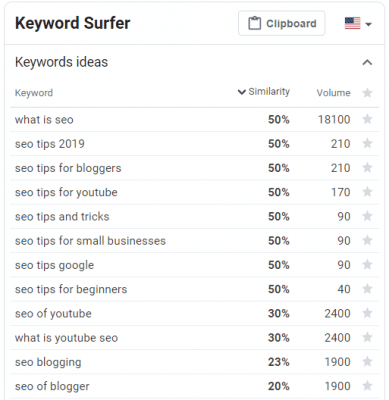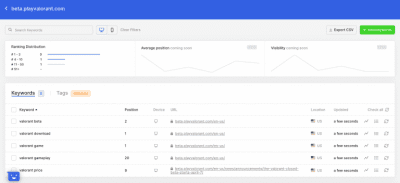Implementing SEO for startups can be challenging. Search engines typically favor websites with high domain scores, thousands of links, and a steady stream of new content.
When competing against more prominent companies in SEO, many startups become discouraged because of this favoritism by search engines. It is a big mistake that many startups make.
The success of your SEO efforts comes down to the brains and creativity that your company implements. The reason SEO is such a powerful resource for startups is that it doesn’t take a massive budget, it just takes effort and time, to drive substantial high-intent traffic to your website.
Startups lack money. But startups have a lot of time and effort.
Which is what makes SEO and content marketing perfect for them.
Search Engine Optimization is one of the best ways startups can succeed in the growth phase while keeping their costs low.
Many successful startups wouldn’t be the companies they are today without having implemented the right SEO strategy for their business. Search Engine Optimization has gotten more challenging over the years, causing many new startups to do a terrible job at it.
Some companies will even ignore it and claim they are trying to optimize for users instead of search engines. The flaw with this approach is that you need to be able to do both. Don’t let your startup miss out on the benefits of implementing SEO!
In this post, I’m going to share with you seven detailed must-do SEO strategies for startups that you can implement immediately. These tactics will show you how to utilize SEO to gain traction regardless of your size, budget, or industry.
Target Small Keywords First – Then Build Upon your Success

Conducting proper keyword research is one of the most critical steps to implementing successful SEO for startup businesses. Picking the right keywords is going to be crucial to get the most out of the next steps in this post.
As a new company, we know that competing for highly trafficked keywords on Google is going to be next to impossible at this stage. This is because many large companies will rank higher than us due to massive amounts of website traffic and hundreds of thousands of links they already are getting.
Instead, we are going to break down parts of our target market and choose a smaller one to focus our SEO efforts. When conducting SEO for a startup business, we need to target low-competition keywords, even if they don’t necessarily best describe our business. You may be asking, how do I find keywords that my company can target and rank?
One tool we found in our analysis of the best free SEO extensions is a program called SEOquake. This software comes with an enormous amount of functions that you can use to improve every aspect of your website’s SEO. This Google Chrome extension will give you real-time SEO data directly in your browser.

For the sake of finding small keywords to target for your business, we recommend focusing on the keyword difficulty segment. The keyword difficulty segment is a good indicator of how hard it will be to rank for a given keyword. This percentage is calculated based on the domain scores of websites that rank and the number of search results for each keyword.
You should also look at the estimated search volume per month shown by the tool and the average cost per click associated with a keyword to see if it’s worth targeting.
 Another tool that we recommend startups utilize for SEO research is Keyword Surfer. This software is another Google Chrome Extension that will give you keyword suggestions based on the keyword you searched in your browser.
Another tool that we recommend startups utilize for SEO research is Keyword Surfer. This software is another Google Chrome Extension that will give you keyword suggestions based on the keyword you searched in your browser.
By Googling the keyword “SEO tips,” I was able to see similar keywords using the tool and the estimated monthly search volume for each. This tool can be a great asset for finding keywords that have a good search volume, are similar to higher trafficked keywords, and are easier to target.
Once you have worked your way up to ranking on the first page for the section of the market you focused on, you can begin to expand to another part. Once you start ranking for that niche, you should target another one and repeat that process over and over. Once you have grown your SEO rankings enough, you will have established a steady stream of traffic that will further increase your rankings. Your company should repeat this process over and over until you can rank for more significant keywords.
Create Valuable Content Frequently

Once you have decided on a keyword to target, the next step is to create valuable content using that keyword. Creating content that will rank well for your target keyword can be done by understanding your user’s needs, researching competitors, and writing articles that go beyond the basic ones that rank for that keyword.
Here are the benefits of regularly publishing quality content can have on your SEO efforts:
- Increase your Website Reach: The more posts that you make on your website, the more pages that Google can index in its search engine. This leads to more keywords you can rank for and higher potential traffic to your site.
- Receive More Inbound Links: By creating quality content, you increase your chance of other websites finding and linking back to your website. Receiving links back to your site will give your SEO an enormous boost and skyrocket your search engine rankings.
- Higher Brand Credibility: Publishing content that is unique and valuable will help establish your company as a leader in its market. This content will contribute to higher brand credibility and build trust with potential new customers.
On-Site Optimization
 Search engines will frequently crawl your website for content so that they can best display it in their search results. Having the right on-site optimization strategy is crucial for ranking higher in search results. So how can you on-site optimize your startup and ensure that you’re doing it right?
Search engines will frequently crawl your website for content so that they can best display it in their search results. Having the right on-site optimization strategy is crucial for ranking higher in search results. So how can you on-site optimize your startup and ensure that you’re doing it right?
The first step to on-site optimizing your business is to enhance your website’s content, such as images and text.
We’ve made a list of tips that you can follow to optimize your content best:
Image Optimization:
- Include your target keyword in your image’s file name and alt tag.
- Resize and compress your images to reduce page load time. If your website uses WordPress, we recommend installing the plugin Smush to optimize all your images.
Text Optimization:
- Place your target keyword at the beginning of your title.
- Make your title 60 characters or less.
- Add power words and numbers to your title for a higher click-through rate.
- Keep your description under 160 characters.
- Include your focus keyword in subheadings (H1 & H2).
- Use your focus keyword in the first 10% of your content.
- In general, write at least 2,100 words for each post. You should analyze the websites that currently rank on the first page for your target keyword and see how many words they used in their content. The word count of their post is a good indicator of how long your content should be to rank.
Now that we’ve optimized our images and text, the next step is to optimize our website’s structure. When enhancing your website’s structure, your goal should be to create a simple and easy way for users to navigate through your website.
Website Structure Optimization:
- Only include pages in your navigation menu that you want users to view and engage with.
- Keep your navigation menus clean and avoid making them too large.
- Make your website easy for mobile users.
- Fix any broken links on your website.
- Having the right XML sitemap is needed so Google can properly index your site.
- Improve your website load time. Google has begun to use website speed in its ranking algorithm.
The last step to on-site optimizing your content is to optimize your page structure. Here are some tips for improving your page structure to rank better on search engine results.
Page Structure Optimization:
- Always backlink to posts on your website that are relevant to each other. Including backlinks helps users discover similar content on your website and helps search engines understand the relationship between pages.
- Include your focus keyword in your page URL.
- Avoid using more than six words in your page URL
- Include social media links in your posts.
If you’re looking for an easy way to see if you’ve implemented all these tactics correctly, you can check out the free SEO Chrome extension called Checkbot. This free extension tests your site for the 50+ best practices for SEO, speed, and security. It excels at its job of identifying problems early and optimizing your website.
Link Building – Improve SEO for Startups

Link building for your startup is one of the most effective ways that you can improve your search engine optimization. Having other websites link back to your website is a great way to become more trusted and reputable in the Google search ranking algorithm. By receiving backlinks to your website from other websites, your domain score and your rankings will improve.
One way that you can acquire more backlinks to your website is by posting content that mentions specific products or services. By referring and linking a product or service, you can receive backlinks from the supplier via social media or directly on their website.
If you write a product review for a company, they appear more reputable, and its brand reputation will improve. They are likely to share your review on their platforms as well to build trust with new potential users.
 Another great way that you can build more backlinks to your content is by building relationships with influencers in your industry. By reaching out to other startups and small businesses, you can establish mutually beneficial relationships.
Another great way that you can build more backlinks to your content is by building relationships with influencers in your industry. By reaching out to other startups and small businesses, you can establish mutually beneficial relationships.
Suppose you backlink to an influencer’s website in your post; we recommend trying to reach out to them and tell them about it. Keep in mind that one high-traffic reputable link is more valuable than several low-traffic links.
There are several ways that you can make influencers aware of your startup company.
Some good ways to reach out to them include:
- Following them on social media.
- Making helpful comments on their posts.
- Sharing and linking their content.
- Mentioning them in interviews or guest posts
- Sending them helpful updates to their content
Once you’ve established a good relationship with an influencer, you can message them on social media and collaborate. Keep in mind that building valuable relationships with influencers can take a while, so you should start reaching out as soon as possible. These relationships will prove to be mutually beneficial and will improve your startup’s reputation and search engine rankings.
Network Through Social Media and Online Communities
 The next step in improving SEO for startups is to network your company through social media and online communities. By establishing your presence on social media and online communities, you can build trust with potential new users. You can also regularly share and link your content, driving more traffic to your posts, and increasing your search engine ranking.
The next step in improving SEO for startups is to network your company through social media and online communities. By establishing your presence on social media and online communities, you can build trust with potential new users. You can also regularly share and link your content, driving more traffic to your posts, and increasing your search engine ranking.
This step is essential in building your brand reputation and will enhance your link-building efforts. Taking advantage of social media is a must for any startup looking to grow. Some social media sites that we recommend using are Facebook, Instagram, Twitter, and Pinterest.
You can also reach out to or start an online community using Reddit or Quora. The outreach your startup can have by using these platforms will help you build a massive amount of links from different websites.
Analyze What Your Competition Is Doing
 As a startup, you are most likely competing against businesses in a newly competitive market. One way that you can boost your company’s growth and improve your SEO is by analyzing what your competitors are doing. If you’re not aware of what your competition is doing, you may miss out on valuable opportunities for your startup.
As a startup, you are most likely competing against businesses in a newly competitive market. One way that you can boost your company’s growth and improve your SEO is by analyzing what your competitors are doing. If you’re not aware of what your competition is doing, you may miss out on valuable opportunities for your startup.
You can get the upper hand on your competitors by going to their web pages and seeing which keywords they rank. Once you have determined the keywords that are driving traffic to their site, you can target them yourself and compete with them. You can do this practice if you are having trouble finding new keywords to focus on for your business.
Another way that you can get the upper hand with your search engine rankings is to use free SEO tools. You must take advantage of as many free SEO tools as possible to cut back on spending. There are hundreds of tools available on the internet that will help you improve the success of your search engine optimization.
A great way to analyze your competitors is by plugging their domain into a keyword tool like Ubersuggest. This tool will show you a detailed list of keywords that your competitor is currently ranking. This strategy can be an effective way of finding new keywords to target and new topics to create content.
Track Your Results

The last step in improving SEO for startups is to track your results. The only way you can ensure that you are successfully implementing these strategies is to keep track of your rankings. If you aren’t ranking for specific target keywords, try some smaller ones or update the page using info from competitors that are ranking for that keyword.
There are hundreds of tools that you can utilize to track your search engine rankings. We’ve compiled a list comparing the 11 top free SERP tools that will track your startup’s search engine rankings. We highly recommend using these free tools for your startup business.
Once you have chosen a SERP tracking tool, it’s essential you continuously keep track of your rankings. Measuring your results is the best way to understand which type of posts are performing the best. These tools will also show you which posts are performing worse over time so that you can go back and revise them.
Other SEO Resources from YoYoFuMedia
- Wix SEO Tips – Best Practices to Improve Your Rankings
- The Must-Have Squarespace SEO Checklist
- SEO for Amazon Alexa: Optimizing for Voice Search
- 9 Must-Have Free Chrome Extensions That’ll Improve Your SEO
Other Shopify Resources from YoYoFuMedia






